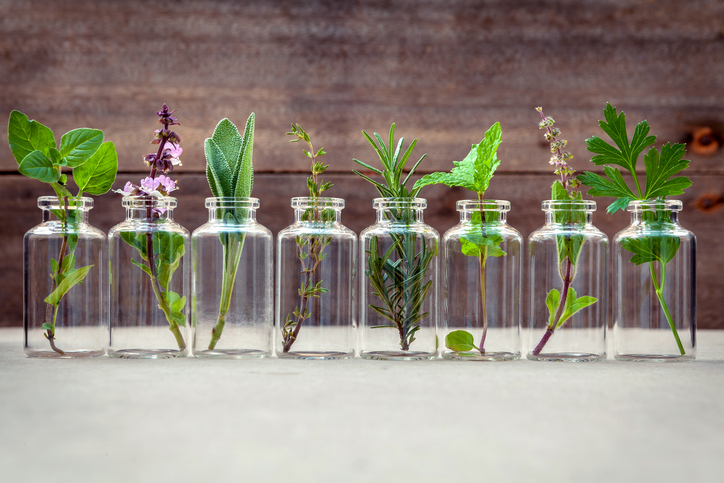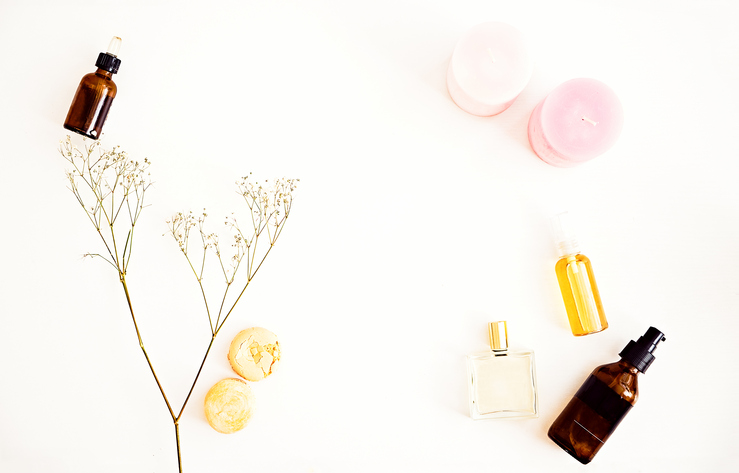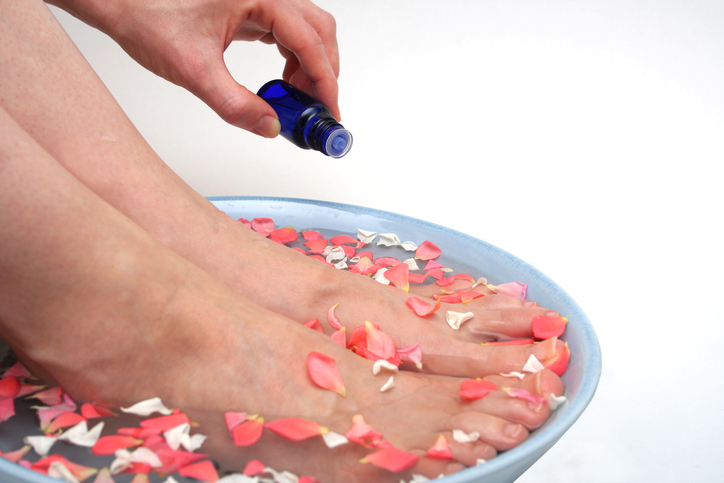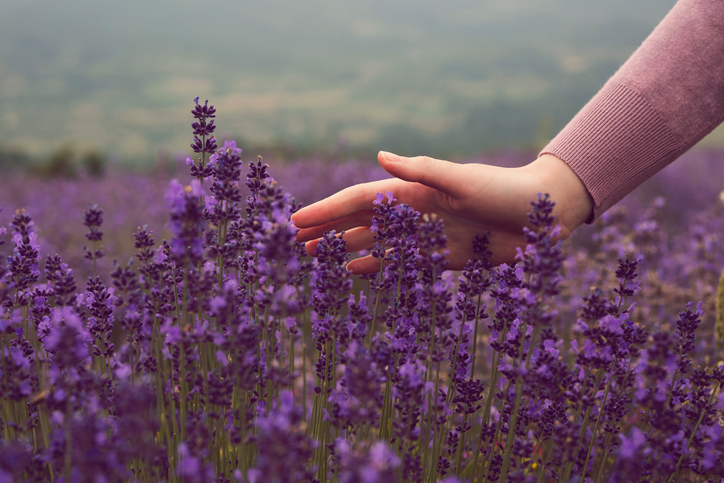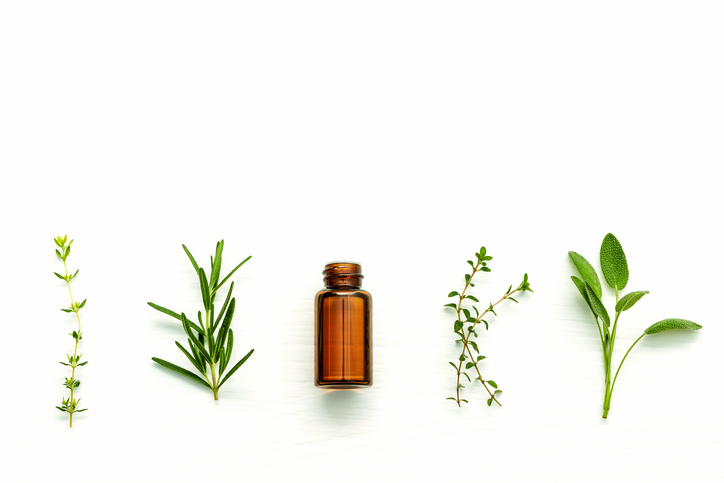
You may have noticed that essential oils are popping up in day spas, home parties, and medicine cabinets near you. That’s because the industry experts think we will be buying $11.5 billion worth of essential oils by 2022.[ref url=”https://www.alliedmarketresearch.com/essential-oils-market”] Companies make health claims spanning from simple stress relief to helping with stomach aches and migraines, even to extreme claims like cancer.
To be honest, more than ten years ago I wrote essential oils off as basically useless after diligently trying a bunch of expensive ones from Australia. However, after learning more from people who actually study them, I’ve learned that in the right hands and put in the right places, they can be powerful. So powerful in fact that we use them to enhance recovery in the 40 Years of Zen intensive neurofeedback brain training program.
So, here’s everything you need to know about what’s in those little expensive half-ounce bottles. How can you tell if what you’re looking at is basically just natural perfume, medicinal, or simply placebo? Will you really be stronger if you smell like potpourri?
Read on to find out.
What are essential oils?
Usually, when a nutrient is essential, it means your body can’t make it. You get essential amino acids and essential minerals from food or supplementation, and even essential fatty acids like DHA from fish.
Plant essential oils are not actually essential for your body even though the name is confusingly similar.
Here, the word essential refers to the essence of the plant – the odorants, the aromas, the volatives – the molecules that you detect as a scent. You don’t need essential oils to function.
Given that one of your most primordial senses is your sense of smell, it makes sense that these molecules could have an impact on your brain or your body. It turns out they do, at least some of the time. If you read my new Head Strong book, you know that all of your senses are mediated by your mitochondria. Your mitochondria use all your senses to decide how your body will react to the world around you.
How essential oils work
Even though you rely heavily on vision and hearing, you can easily block those senses by closing your eyes or plugging your ears. It’s impossible to turn off your sense of smell unless you figure out an alternative to breathing. That’s nature telling you to be keenly aware of the chemicals around you. As our oldest group of senses, chemosensation – smell, taste, and touch/heat – is the earliest kind of communication we have.[ref url=”http://www.wiley.com/WileyCDA/WileyTitle/productCd-0471257214.html”] Plants produce volatile oils to communicate with the world around them as well.
The essential oils in plants attract pollinators by sending species-specific aromatic invitations into the wind.[ref url=”http://www.sciencedirect.com/science/article/pii/S1369526602002510″][ref url=”http://www.apsnet.org/edcenter/intropp/topics/Pages/OverviewOfPlantDiseases.aspx”]
Plants also provide defense mechanisms that resist disease and prevent bugs and herbivores from eating or damaging them. These include sending out scents that alter heart rate, cause confusion, mess with hormones, or attract the herbivore’s predators.[ref url=”http://www.sciencedirect.com/science/article/pii/S1369526602002510″][ref url=”http://www.apsnet.org/edcenter/intropp/topics/Pages/OverviewOfPlantDiseases.aspx”] A qualified practitioner will help you harness these nuanced effects to your advantage…but dumping a bottle on your neck might not have the same effects.
The active compounds in essential oils
When talking about the active compounds in essential oils, you hear about the pinene in pines or the limonene in lemons.
Essential oils contain a massive amount of terpenes, aka hydrocarbons found predominantly in plants.[ref url=”https://www.merriam-webster.com/dictionary/terpene “] Even though lots of plant compounds have effects, the terpenes account for the vast majority of essential oil constituents and medical actions. Research shows that specific terpenes protect DNA, slow tumor growth, lower LDL cholesterol, reduce blood pressure, and kill germs.[ref url=”http://onlinelibrary.wiley.com/doi/10.1002/ptr.2072/full”]
So maybe some of those big-sounding claims have merit. But the devil is in the details.
How are essential oils made?
Extraction method matters when choosing an essential oil to use for therapeutic purposes, so let’s do a quick rundown of the best ways to isolate the bioactive compounds of plants:
Steam distillation
Steam distillation involves pumping steam into a distilling pot that holds the plant material. As the steam passes through the plant material and rises to the top, it extracts the essential oil and carries it into the condenser. The vapor then changes to liquid water and oil, and because oil and water do not mix, the essential oil floats on top of the water. At this point, the water that’s left becomes a hydrosol, a dilute aromatic water that has therapeutic value.[ref url=”http://www.sciencedirect.com/science/article/pii/S0965229916300632″]
Solvent extraction
Some essential oil molecules break down with heat, so solvent extraction keeps delicate compounds intact. Solvent extraction involves mixing plant material with petroleum ether, methanol, ethanol, or hexane until the essential oils dissolve, forming an absolute – a solvent-extracted essential oil. Some practitioners will not use absolutes because the process leaves behind solvent residues.[ref url=”https://naha.org/explore-aromatherapy/about-aromatherapy/how-are-essential-oils-extracted/”]
CO2 extraction
Carbon dioxide gas converts to a liquid state under high pressure, which then dissolves molecules from plant material. Once dissolved, the liquid carbon dioxide returns to normal pressure, changing the CO2 back to a gaseous state. The gas disperses, leaving essential behind. When you’re after a complete profile of the plant’s lipids and waxes, look for a CO2 total, in which the extraction happens at a much higher pressure.[ref url=”https://www.aromaweb.com/articles/whatco2s.asp”]
How are essential oils used?
Essential oils make appearances all over blogs and social media in recipes for homemade lip balms, DIY deodorant, non-toxic cleaning supplies, and air-freshening diffuser blends. Once dabblers graduate to using oils for therapeutic effects, they have several delivery options.
Inhalation
Most commonly, you inhale essential oils by exposure. For example, you detect distinctive odorants when walking through pines or smelling flowers. Specialized essential oil diffusers disperse a mist of essential oils for inhalation. Less commonly, a practitioner will advise that you instill essential oils—shoot them directly into the nose by a specially-designed inhaler or swab. These inhalers come pre-loaded with diluted essential oil, which makes it easy to use. It’s a bad idea to haphazardly snort essential oils without knowing what you’re doing. Some oils are strong enough to cause damage to your sinuses unless you dilute them first.
Scientists have tracked compounds along a direct nose-to-brain pathway that bypasses the bloodstream and even the blood-brain barrier, making inhalation a quick and targeted delivery method.[ref url=”https://www.ncbi.nlm.nih.gov/pubmed/15501485″]
Ingestion
You ingest essential oils by encapsulating with a carrier oil (more on carriers, coming up) or by drinking a few drops mixed with water. Consult a qualified practitioner before ingesting essential oils. Some wipe out friendly gut flora on contact (like oregano, clove, thyme), and others burn like basement moonshine going down (like oregano, lemongrass). Know what you’re working with.
Transdermal
Diluted in a carrier oil or made into balms and salves, apply essential oils topically to your skin. Dilution is tricky, so we’ll break that down. As I learned from the Doctor of Oriental Medicine who works at 40 Years of Zen, and from Dr. Barry Morguelon, the UCLA surgeon and grand master of an ancient Chinese energy medicine tradition who wrote the meditation in Head Strong, *where* you put the essential oils matters too.
That’s a big reason I didn’t find effects when I first used them. A drop of oil on the acupuncture meridian on your foot will do something different than a drop of oil on your forehead.
How to dilute essential oils
Rarely, and only under the guidance of a qualified practitioner, are essential oils used “neat,” at full strength. Sensitization (allergy) develops when using oils with even the mildest chemistry. As a practical matter, essential oils are expensive at full-strength or cheap and effective when properly diluted. Some companies have started promoting using full strength oil, but that’s mostly because it makes you use a lot more expensive oil. The pros I work with don’t do that.
Concentration
As a general guideline, most adults do well with mild essential oils diluted at 2-2.5%. So, for every 5ml (1tsp) of application, two drops of essential oil go into 98 drops of carrier oil. When diluting, do not assume that the essential oil of a common plant is safe. Cinnamon, though safe in spice form sprinkled in your Bulletproof Coffee, contains cinnamaldehyde, which causes cinnamon allergy, skin irritation and even second-degree chemical burns.[ref url=”http://tisserandinstitute.org/new-survey-reveals-dangers-of-not-diluting-essential-oils/”][ref url=”https://www.ncbi.nlm.nih.gov/pmc/articles/PMC1306205/pdf/westjmed00178-0099a.pdf”] Seek the guidance of a qualified practitioner or expert user when deciding on concentration, especially with more potent oils.
Choosing a carrier oil
For instant absorption into the affected area or the bloodstream, “dry” oils, or lightweight oils with a molecular weight less than 500 Dalton, make the most efficient carrier oils. Brain Octane Oil is a dry oil that effectively dilutes the essential oil, then ushers the compounds across the epidermal and dermal layers into the bloodstream or target tissues. Plus, your skin loves it.
Do essential oils work?
The quick and dirty answer is, much like pharmaceuticals, there is no quick and dirty answer. Some essential oils work well for some things; others work well for other things. Some smell nice, and it stops there. Let’s see what the research says about the effects of essential oils.
Focus
Nearly every essential oil supplier sells blends to help with concentration, and many claim to help kids focus in school. In one double-blind placebo-controlled study, subjects experienced increased alertness and memory after taking doses of sage essential oil.[ref url=”http://www.sciencedirect.com/science/article/pii/S0031938404004032″]
Diffusing rosemary essential oil may improve your performance of cognitive tasks. In one study, researchers demonstrated a correlation between the level of participants’ improvement and the amount of 1,8-cineole (the active compound in rosemary) measured in the bloodstream.[ref url=”http://journals.sagepub.com/doi/abs/10.1177/2045125312436573″]
Pain
Essential oils are attracting attention for pain relief and prevention in the hospital setting. Inhaling lavender essential oil reduced the post-op use of acetaminophen in children who had just had their tonsils removed, and another study showed a quick swab of lavender before the insertion of hemodialysis needles reduced the pain of insertion.[ref url=”http://www.sciencedirect.com/science/article/pii/S0165587613003479″][ref url=”http://www.sciencedirect.com/science/article/pii/S0965229915000345″]
Wintergreen oil contains methyl salicylate, which acts similarly to aspirin in the body.[ref url=”https://www.ncbi.nlm.nih.gov/pmc/articles/PMC3995208/ “] Pharmaceutical companies have known this for over a century—you will see methyl salicylate and menthol, the cooling compound in peppermint, listed as the major active ingredients in commercial sports creams.
Nausea
Great news—research showed that pregnant women experienced relief from inhaling lemon essential oil as soon as that queasy feeling hit, and peppermint essential oil resulted in less anti-nausea medication use after surgery.[ref url=”https://www.ncbi.nlm.nih.gov/pubmed/24829772 “][ref url=”http://onlinelibrary.wiley.com/doi/10.1046/j.1365-2648.1997.t01-15-00999.x/full “]
Testosterone
Mountain savory deserves a closer look as a testosterone enhancer. Diluted in drinking water, it increased testosterone and decreased estrogen in male and female broiler chicks and increased testosterone in rats.[ref url=”http://web.a.ebscohost.com/abstract?direct=true&profile=ehost&scope=site&authtype=crawler&jrnl=13006045&AN=101126268&h=pVGQksDnDSyAbtyPGZ4A5WM7EhirNCsCHHMvOgPSNh4kCilagA6LOJhF9Kyv%2f2gEHmobXvQHckvBoqJwJbZzaA%3d%3d&crl=c&resultNs=AdminWebAuth&resultLocal=ErrCrlNotAuth&crlhashurl=login.aspx%3fdirect%3dtrue%26profile%3dehost%26scope%3dsite%26authtype%3dcrawler%26jrnl%3d13006045%26AN%3d101126268″][ref url=”http://www.sciencedirect.com/science/article/pii/S0367326X06001687 “]
Maybe smelling like chicken soup really is good for your testosterone? I haven’t tried this one yet, but I will.
Are essential oils safe?
Swiss physician and alchemist Paracelsus coined the old toxicology adage, “the dose makes the poison,” which claims that anything is toxic if improperly or excessively used.
For example, you swallow small amounts of bergamot essential oil, the flavoring in Earl Grey tea without trouble. The same plant’s essential oil causes skin burns when followed with sun exposure.[ref url=”http://www.sciencedirect.com/science/article/pii/S0190962201805545″] Rubbing diluted wintergreen into a sore muscle provides almost instant relief. Taking a few teaspoons of straight wintergreen is like downing a few fistfuls of aspirin.[ref url=”http://go.galegroup.com/ps/anonymous?p=AONE&sw=w&issn=00943509&v=2.1&it=r&id=GALE%7CA8283911&sid=googleScholar&linkaccess=fulltext&authCount=1&isAnonymousEntry=true.”] Essential oils cause seizures, hallucinations, and unconsciousness.[ref url=”https://www.ncbi.nlm.nih.gov/pmc/articles/PMC4395957/”][ref url=”http://www.tandfonline.com/doi/abs/10.1081/CLT-100102450?journalCode=ictx19″][ref url=”https://www.ncbi.nlm.nih.gov/pubmed/12813303″] And not the good kind.
That said, the majority of these potent little vials will not likely give you much trouble if carefully diluted, if properly used, and under the guidance of a trained acupuncturist, aromatherapist or advanced user. Essential oils deserve the same respect you would show your prescriptions. Keep them out of reach of children and consult trusted sources before you use them.
Watch out for man boobs, and other considerations
Lavender and tea tree oil caused gynecomastia (man boobs) in adolescent boys, which reversed when the boys stopped using topical products containing lavender and tea tree oil, but no significant estrogen changes were observed in studies with larger sample sizes.[ref url=”http://www.nejm.org/doi/full/10.1056/nejmoa064725#t=article”][ref url=”https://www.ncbi.nlm.nih.gov/pubmed/23358464″]
I actually notice this effect. If you’re a long-time reader, you may know that all the men in my family have man boobs, so I’m always working to keep it from happening to me. Lavender did give me more heft in the chest, and not the pecs kind!
Also, remember that it’s rude to walk around smelling like a fragrance counter ambush. You could trigger some unpleasant to awful reactions in people around you with sensitivities. I’ve been on airplanes that reeked of essential oils, and clearly, lots of people weren’t happy about it. So use them at home, ok?
Which essential oils do I buy?
The government does not regulate essential oils, so your best bet is to watch out for manufacturers that cut them with toxic chemicals or cheaper oils. So, quality matters. The most advanced practitioners have access to high-end essential oils that they procure because they know the right people. Make sure you’re buying what you think you’re buying. Find a brand that offers third-party gas chromatography and mass spectrometry (GC/MS) testing reports.
None of the brands I use is widely available because they come directly from the people who manufacture them in small batches.
Self-experimentation
The masters at 40 Years of Zen use every hack available to speed recovery and increase resilience so that clients can do more training per day. Trained acupuncturists use essential oils in combination with acupuncture points to shorten the path to peak performance.
- At first signs of anxiety, dilute spearmint and chamomile in Brain Octane Oil and apply to the vagus nerve (straight down the neck starting below the ears, especially on the left)
- Diffuse sandalwood into the air to enter a state of relaxed readiness
- Dilute bergamot and vetiver in Brain Octane and rub counterclockwise on the upper abdomen to maximize confidence and eliminate insecurities (strangely, this works)
If you want to give essential oils a go, here are a few easy ways to see if they fit into your performance-enhancing regimen:
- Focus: Diffuse rosemary with either bergamot or geranium.
- Sleep: Add a 10-30 minute diffusion of lavender and chamomile to your sleep hacking regimen.
- Mood: Add 5-10 drops of orange or bergamot to your shower to see if you get a mood boost out of it.
- Beauty: Save your coffee grounds, grab your peppermint and mix up the coffee ground hair mask found here.
- Deliciousness: Treat yourself with a Bulletproof Peppermint Mocha by adding one drop of peppermint essential oil and 1 tbsp. of Bulletproof Hot Chocolate to your Bulletproof Coffee. In addition to being delicious, peppermint is great for your gut.
If you want to get serious about using essential oils, find a qualified and trusted acupuncturist, aromatherapist, naturopath or advanced user to guide you. Worst case scenario, essential oils can kill in extreme cases. They also cause injury, illness or allergy. Slopping them wherever might produce no effect, and why waste your money? Find someone who will keep you safe and help you get some performance ROI. Look for acupuncturists and herbalists to show you the ropes. Part of what they do is help you select what will work for you – each constitution is different.
As I type this, I might smell of sandalwood, black spruce, and lilly of the valley. Just sayin’. 🙂
Hope you enjoyed this post! Thanks for reading and have a great week.
